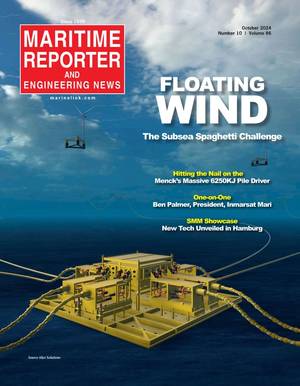
IMO
There are numerous organizations with the abbreviation "IMO," but assuming you are referring to the International Maritime Organization (IMO), here's a detailed overview:
International Maritime Organization (IMO)
The International Maritime Organization, often abbreviated as IMO, is a specialized agency of the United Nations responsible for regulating shipping. The IMO was established in 1948 and came into full force in 1959. Its headquarters are located in London, United Kingdom.
Mission and Objectives
The IMO's primary mission is to create a regulatory framework for the shipping industry that is fair, effective, universally adopted, and universally implemented. The organization focuses on several key objectives:
- Safety and Security: Establishing international safety regulations to ensure the security of life at sea.
- Environmental Protection: Setting standards to minimize the environmental impact of shipping activities.
- Legal Matters: Developing international maritime law to ensure efficient and equitable shipping practices.
- Technical Cooperation: Providing technical assistance and capacity-building programs, especially for developing countries.
- Efficiency and Facilitation: Streamlining procedures for international shipping to make maritime transport more efficient and cost-effective.
Key Conventions and Regulations
The IMO is known for several important international treaties and conventions, such as:
- SOLAS (Safety of Life at Sea): One of the most important treaties focusing on ship safety.
- MARPOL (Marine Pollution): International regulations aimed at preventing pollution from ships.
- COLREGs (Collision Regulations): Regulations for preventing collisions at sea.
- STCW (Standards of Training, Certification, and Watchkeeping for Seafarers): Setting qualification standards for seafarers.
- IMDG Code (International Maritime Dangerous Goods Code): Regulations for the safe transport of hazardous materials and dangerous goods.
Structure and Governance
The IMO consists of an Assembly, a Council, and five main Committees:
- Assembly: The highest governing body, composed of all Member States, which meets every two years.
- Council: Acts as the executive organ and is responsible for ensuring the functioning of the IMO.
- Committees:
- Maritime Safety Committee (MSC)
- Marine Environment Protection Committee (MEPC)
- Legal Committee
- Technical Cooperation Committee
- Facilitation Committee
Membership
The IMO has a wide membership, with around 174 Member States and three Associate Members as of 2023. These members are primarily countries with maritime interests.
Achievements and Impact
The IMO has made significant contributions to maritime safety and environmental protection:
- Reduction in Maritime Accidents: Implementation of rigorous safety standards has led to a marked decrease in maritime accidents.
- Mitigating Environmental Impact: Introduction of cleaner fuel regulations and restrictions on emissions has reduced the environmental impact of the maritime industry.
- Global Standards: The establishment of universally recognized standards has leveled the playing field, fostering fair competition and consistency across the global maritime industry.
If you meant another organization by "IMO company," please provide more context, and I’d be happy to share information accordingly.
- Phone: + 44 (0)20 7735 7611
- Web: https://www.imo.org/
IMO News
Turkey Consents to Ship Recycling Convention
Turkey, one of the five major ship recycling countries in the world, has ratified the International Maritime Organization (IMO) Hong Kong Convention, the treaty…
IMO Held Trade Facilitation Seminar in Djibouti
New requirements for electronic exchange of data for the clearance of ships become effective from 9 April 2019, said International Maritime Organization (IMO)To help prepare for this…
Russia Assents to Passenger Compensation Treaty
The Russian Federation has acceded to the International Maritime Organization (IMO) treaty dealing with compulsory insurance covering passengers on ships.According to IMO…
IMO Crosses Language Barriers
One of the great strengths of the UN system is its multi-national and multi-cultural nature.As far as possible, UN bodies try to work in their delegates’ own languages…
Polar Radio Communication, Navigation Norms Getting Ready
International Maritime Organization (IMO)’s Polar Code helps ensure that ships operating in the harsh Arctic and Antarctic areas take into account extremes of temperature…
IMO Emphasizes Seafarer Training
The International Maritime Organization (IMO) Secretary-General Kitack Lim has highlighted the need to consider seafarer training and standards as shipping evolves…
IMO Worshop on Sustainable Development Goals
To help its Member States gain a better understanding of the Sustainable Development Goals (SDGs) and the role International Maritime Organization (IMO) can play in achieving them…
Maritime Counter-Terrorism Training in Viet Nam
International Maritime Organization (IMO) is assisting the Government of Viet Nam to implement international counter-terrorism measures involving the maritime sector.The…
IMO Training on Managing Security in Djibouti
International Maritime Organization (IMO) is providing training to countries in the west Indian Ocean and Gulf of Aden on managing insecurity in the maritime domain…
IMO Addresses Wreck Removal Challenges
A ship wreck can be a hazard to navigation. Other vessels and their crews can potentially be endangered, and, depending on the nature of the cargo and remaining fuel on board…
IMO Launche Ship Recycling Project in Bangladesh
The second phase of an International Maritime Organization (IMO)-implemented project to enhance safe and environmentally sound ship recycling in Bangladesh has been…
International Maritime Prize Goes to Birgit Sølling Olsen
The prestigious International Maritime Prize for 2017 has been presented to Mrs. Birgit Sølling Olsen, former Deputy Director-General of the Danish Maritime Authority.International…
IMO Highlights Greenhouse Gas Strategy
International Maritime Organization (IMO) is at the UN climate change conference (COP 24) in Poland, highlighting key elements of the Initial IMO Strategy on reduction…
IMO Holds Counter Terrorism Training for S.Asian Countries
Legal experts and port and maritime security officers from Bangladesh, Maldives and Sri Lanka have gathered at International Maritime Organization (IMO) in London…
Seoul Connects Maritime Capacity-building Activities with IMO
The first regional donor/recipient workshop on maritime Technical Cooperation activities held in Seoul, the Republic of Korea (26-30 November). The workshop built…
Singapore Port Readies for IMO 2020
The Maritime and Port Authority of Singapore (MPA) continues to prepare the Port of Singapore and Singapore-registered ships for the International Maritime Organization’s…
IMO Encourages Investments in Alternative Fuels
Technological innovation and the global introduction of alternative fuels and/or energy sources for international shipping will be integral to achieving the overall…
Africa: Empowering Women in Maritime
International Maritime Organization (IMO)'s global programme on Women in Maritime is the latest to feature at the Sustainable Blue Economy Conference in Nairobi…
IMO Focuses on a Blue, Sustainable Economy
A full house at the IMO side event at the Sustainable Blue Economy Conference has brought together experts in the maritime sector, trade and development.Member States of the African Union…
IMO Provides Fellowships for Women in Ports
International Maritime Organization (IMO) has provided fellowships to ten female officials attending a Port Senior Management Programme held at the Galilee International…





